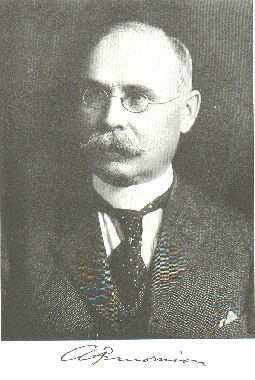
ALEXANDER F. MORRISON
Alexander F. Morrison. In the death of Alexander F. Morrison in 1921, San
Francisco lost one of her most brilliant and best loved lawyers. Many men
achieve some fame and some fortune in the practice of the law, but there are
comparatively few men who so perfectly symbolize the ideals of the profession
as to be loved and reverenced by the older members of the bar, and at the same
time, serve as models of achievement and attainment to the younger men, who are
seriously and earnestly preparing themselves for the highest and best practice
of their profession. By virtue of his comprehensive grasp of intellect, his
inborn sense of justice, his deep human sympathy and his abiding faith in his
fellow men, Mr. Morrison was one of the honored few.
Alexander F. Morrison was born on Washington’s birthday in 1856 in Weymouth,
Massachusetts. At the age of six years, he became a resident of San Francisco.
He took his degrees from the University of California in the Classical
department in 1878, and graduated from the Hastings College of Law in 1881. His
first partnership was with Thomas V. O’Brien; later the firm became O’Brien,
Morrison & Daingerfield. He withdrew from the firm in 1891, and formed a
partnership with C. E. A. Foerster. Both men eagerly and zealously dedicated
their youth to the ardent pursuit of the law. Into this partnership, Judge W.
B. Cope entered several years later. Mr. Foerster was a member of the firm
until his death in 1888, and Judge Cope until his death in 1910. In this year, Mr.
Morrison associated himself with W. I. Brobeck, and subsequently with Mr. P. F.
Dunne, under the firm name of Morrison, Dunne & Brobeck.
One of Mr. Morrison’s outstanding characteristics, in the practice of the
law, was his helpful interest and solicitude for the success of the younger
members of his profession. This interest was exemplified by the fact that he
associated in partnership with him a gradually increasing group of younger men
whom he deemed worthy of recognition and advancement. Mr. Edward Hohfeld was
the first of the younger men to become a member of the firm. In rapid
succession Frank Shuman, Herman H. Phleger, Herbert W. Clark, and Roland C.
Foerster, became present members of the firm of Morrison, Dunne & Brobeck.
Although Mr. Morrison’s practice began without specialization, he developed
into a counselor in the highest sense of that word. He became an advisor whose
active brain never silenced the dictates of his heart. His client’s cause was
always his cause. The humblest of his clients received the same gentle
courtesy, the same watchful care and the same generous interest, as did the
clients representing wealth and position. He never made an effort to secure
clients of wealth and power, and yet they came to him for they knew of his kindness,
his sense of absolute justice, his power of great friendship, combined with his
wonderful ability to control, protect and develop important issues and
interests.
He had charge of many law suits involving properties of great magnitude, and
managed them with the ability and tact that made each client his personal
friend. For the Crocker interests he secured the settlement of the George
Crocker Trust, and he was in charge of the estate of the late Col. Charles F.
Crocker.
He was executor of the Capt. William Matson and Nicholas Ohlandt estates. He
was attorney for the Western Sugar Refining Company, National Ice & Cold
Storage Company, and the Santa Cruz-Portland Cement Company. He was a director
in many important companies, including the Crocker Estate Company. The Crocker
National Bank, the Honolulu Consolidated Oil Company, the Matson Navigation
Company, the Paraffine Paint Companies, Inc., the St. Francis Hotel Company,
and the Honolulu, Paauhau & Hutchison Sugar Plantation Committee.
These activities, in their wide scope, made him part of the financial and
legal history of the city. As he contributed to local contemporary history, he
was himself a great student of all world history, the study of which was his
avocation and delight. He was prominent in scientific and historical research.
In his pursuit of the study of science, economics, literature and history,
he accumulated a very valuable library of over 15,000 choice volumes. The
library stands today as a testimonial to his scholarly tastes.
Alexander F. Morrison was married in 1893 to May B. Treat, a native of San
Francisco, and a classmate of his at the University of California. She is a
daughter of the late George Treat fo Maine, who came to California as a pioneer
in 1849, by way of Mexico and Lower California.
Mr. Morrison died on the 13th day of November, 1921, at Singapore
Straits Settlements, while service as a member of a commission sent by the
chamber of commerce to strengthen international relations with the Orient.
The news of his death was cabled home, the business and legal world of San
Francisco mourned the loss of one of its ablest business leaders, one of the
most distinguished lawyers, one of its best-beloved friends.
Transcribed by: Elaine Sturdevant.